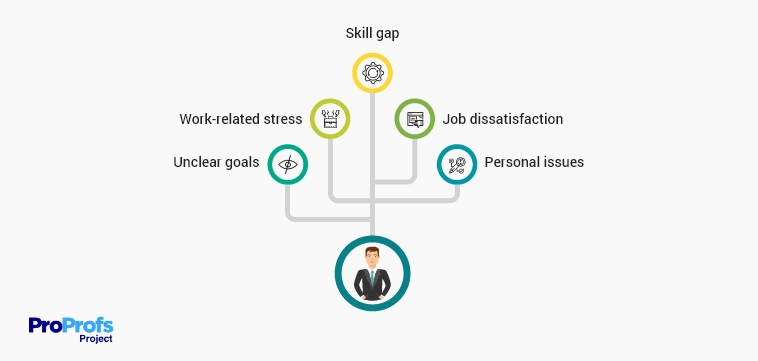Have you ever found yourself questioning how to manage underperforming employees at work?
As a project manager, there may be times when you are required to deal with staff who just aren’t performing when compared with their peers. Either they are delivering work below the established standard or are missing task deadlines frequently, or doing both.
If a member of your staff is not delivering or performing well then it’s time to step in and take action.
But what is the best way to handle such a delicate situation and turn your underperforming employees into productive resources?
Here are some tips on how to handle underperforming staff at work with ease.
What Does Underperformance Mean?
Underperformance happens when employees fail to deliver the standard of work as is expected of them.
You may classify an employee as an underperforming one if:
- They deliver unsatisfactory work performance. This can mean not completing work duties, missing deadlines, or delivering low-quality work.
- They do not comply with policies set in place within the workplace or do not adhere to set procedures
- They behave unacceptably in the workplace i.e. badmouthing other employees, arriving late to office and meetings, etc.
It is important to know what you are expecting from your staff and what you classify as underperformance. Also, it is important that all staff and team members are clear on what is expected of them, what they should be achieving, what their individual targets are and their targets as a team.
They all need a good understanding of the end goal, and a clear layout on how to get there. Without this, it would not be fair to tell staff that they are not performing well when they have no markers to gauge their performance.
So, when you have clear-cut markers, targets, and goals, it is easy to identify underperformance.
What Causes Employees to Underperform?

If you are constantly struggling to find the answer to – ‘how to handle an underperforming employee, we’ve got you covered. Here are some of the root causes that affect employee performance at work.
A. Skill gap
Often, an employee may not have the required skill set to achieve your company or project goals. These skills may be time management, teamwork, self-management, or problem-solving. Every role demands a specific skillset and if employees lack those skills, they are likely to feel underconfident and perform poorly.
B. Job dissatisfaction
Job dissatisfaction is one of the most common reasons for underperforming employees. This may be a reflection of a lack of growth opportunities or getting underpaid for the job.
C. Work-related stress
A negative or high-pressure work environment is cited as the most popular reason for employee underperformance. Stress often leads to frustration, which further affects employees’ behavior and performance in everything they do
D. Unclear goals
Lack of clarity on organizational goals and objectives is bound to create confusion, With no defined goals, employees are likely to go off track and deliver less than what they are capable of.
E. Personal issues
While one is expected to keep personal and professional life separate, personal issues often make their way into the workplace. These issues can sway their focus from work and negatively impact their ability to perform.
How to Manage Underperforming Employees
You need to have clear-cut procedures as a manager in order to deal with underperforming staff. A consistent approach combined with the right attitude can go a long way in turning employees into above-average performers.
Here are a few steps you can adopt to address employee underperformance.
1. Spotting Underperformance
Recognizing that there is a problem is the first step towards resolving the issue. Look for signs that imply underperformance. Some of these signs may include reduced work output, unprofessional behavior, recurring conflicts with employees, and increased absenteeism from work. If you happen to spot these issues, act on them immediately.
Get in touch with the employee and explain them where they are lacking. Give proper and timely feedback. Providing personalized training to the employee can help them climb the ladder step by step.
2. Hold One-on-One Meetings With Employees
Ask employees about the reasons behind their lack of motivation and productivity. Conduct face-to-face meetings with each employee and ask the right set of questions. Start by asking them how clear they are regarding their goals and tasks. If there is confusion, clear it right away and find out ways to help employees work with focus. Bring instances of underperformance to the employee’s attention and show how it affects the overall company growth.
3. Communicate Job Expectations
Employees should be aware of what you expect of them and what the role demands. Many times employees underperform due to a lack of awareness of your company’s quality standards and job expectations. If required, walk employees through their roles and responsibilities so that there is no room for confusion or misunderstanding. Remind them of their duties, their role in the overall project, and show them how their contribution will make a difference.
4. Identify Your Employees’ Unfulfilled Expectations
One of the key reasons behind employees’ underperformance at work is unfulfilled expectations. Find out what employees expect from you regarding their career growth, compensation, job security, etc. Listen to what they have to say and see if you can meet their expectations. For example, employees tend to lose the motivation to perform if they are not compensated well for the responsibilities taken in the past. In such instances where there is a mismatch in what they expect from you and what you provide to them, it’s best to find a middle road that benefits both sides.
5. Build the Roadmap to Achieve Better Performance
Involve your employees in creating an action plan to improve their performance. Now that you have identified and discussed the problems, you can work on a plan to bring employees back on the right track. Ask them to come up with their own solutions as to how they can improve. Ask them about the areas they need some help with. Perhaps there is some training or learning you can conduct to help them in the process. Once you have an action plan in place, come to a mutual agreement regarding the timeframe within which performance improvement should be achieved.
6. Set Regular Check-Ins
Hold regular meetings with employees to track the progress they have made on the action plan. It is important to give them enough time to reflect on the improvement areas and take necessary steps. When you conduct such check-ins on a daily or weekly basis, it gets easy for them to monitor their own improvement and find and fix the roadblocks. With these meetings, you will be able to track the situation better and identify if employees need any training or support from your end.
7. Recognize Small Wins
It takes a good amount of hard work for an underperforming employee to move to the high-performance zone. Don’t let their hard work go unnoticed. The more you will acknowledge and appreciate them openly, the more motivated they will be to achieve the ideal performance level. Your words of appreciation can leave a lasting impact on employees, increase their confidence level, and inspire them to always strive for betterment.
8. High-Performance Coaching
Give adequate opportunities to an employee to get to the level of work that is desired from him. For this, you may have to conduct performance coachings such as expert sessions and regular training that will aid employees to grasp things faster and achieve their maximum potential. Identify where the employee is lacking and conduct a specialized session devoted to that problem area only. This will enable the employee to grasp things better and perform as expected for upcoming projects and tasks.
9. Offer Constructive Feedback
Be constructive with feedback. Ask them if they require more help in terms of understanding their key tasks and responsibilities.
Identify specific areas that require more attention. Convey your concerns to the employee. If you see them improving, provide positive feedback immediately. Positive feedback acts as a key factor contributing to motivated employees who excel at each task that they are assigned.
10. You Know When It’s Time to Make a Decision
Dealing with the underperforming staff is not a cakewalk. When you’ve tried everything to bring an employee’s performance to the optimum level but nothing changes, it’s time to make a decision.
This decision may not always be pleasant, however, this is in the best interest of both the company and the employee.
See if the employee is better suited for some other task within the company. If this seems like a good option, you may go ahead with it. The employee may be able to perform better in a department where his skills complement the work.
As a last resort, if the employee fails to comply with company standards and is not delivering work as expected, termination of the employee is sadly the best option. For this, it’s best to get HR involved and take the next steps.
11. Promote a Healthy Work-Life Balance
Create a work environment that motivates employees to embrace life apart from work. This will inspire them to accomplish goals and objectives while also living life to the fullest.
You can work towards fostering such a culture by having a one-on-one interaction with your employees. Ask them how they are and how things are at home. Get to know them personally. Remember to be cordial and not cross the line while asking questions. Discussing sports, movies, or their hobbies is a great way to establish a friendly relationship with your employees, enabling them to perform better at work.
How to Motivate an Underperforming Employee
Sometimes a push in the right direction is all that an employee needs to meet or even surpass expectations at work.
Let’s look at how you can motivate underperforming employees to work with dedication and meet your performance expectations.
a. Support a Better Work-Life Balance
Start a conversation with your employees and discuss if anything is bothering them in their work or personal life. If you show genuine concern, employees might end up sharing their problems openly. Use this as an opportunity to guide employees on what they should do to not let personal issues impact their performance. You should also guide them on how they can make time for their family and friends without compromising on their professional duties.
b. Use Personal Anecdotes as a Means of Persuasion
Underperforming employees already lack the motivation to work. Personal anecdotes can do a wonderful job of inspiring them to not give up, come what may. Remember to be specific about the issues that are bothering you. Is it their quality of work? Or is it the speed at which they are delivering work?
Use personal anecdotes related to these issues and show employees how they can follow suit and bring a significant improvement in their performance. Being aggressive will only add to the employee’s inability to perform, stagnating their improvement right there. Sharing an anecdote or two of how you or a fellow teammate excelled at a task that previously seemed impossible is a good way to motivate underperforming employees.
c. Emphasize Their Strengths
Every employee will come with a unique set of strengths. Even if an employee is underperforming, there will always be something that will reflect their strength areas as well. Identify these strengths and try to build on them. Most often, these strengths are what will help the employee to rectify their weaknesses and improve their performance in the future.
Address Underperformance & Improve Employee Efficiency
When it comes to managing underperforming employees, it may seem time-consuming to coax an employee into performing better. The recurring doubt of how to manage underperforming employees may push you into thinking that hiring or retaining a particular employee was a mistake.
However, with the right action plan in place, your underperforming employees may even go on to become the most productive ones in no time.
Thus, hold on a little longer when you encounter such scenarios and lead your employees to efficiency with proven strategies such as conducting regular meetings, clearly conveying your expectations, and celebrating small wins.
FREE. All Features. FOREVER!
Try our Forever FREE account with all premium features!





